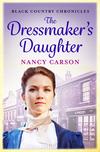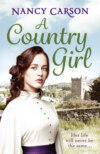Kitabı oku: «A Fallen Woman», sayfa 2
Chapter 3
Brierley Hill’s High Street was a stretched-out thoroughfare, the busy main highway that carried the horse-drawn traffic and steam tramcars between the larger towns of Dudley and Stourbridge. The road was lined on either side with black, cast iron gas street lamps, public houses and terraces of shops with doors invitingly open. The spaces over shop windows were bedecked with painted wooden boards and sometimes enamelled metal panels, painted in black or green, with fancy white lettering, informing the passer-by of treats that lay within, or which upright citizen owned the emporium.
One such panel announced the Drapery, Mourning and Mantles Establishment of Eli Meese, Esq. It resembled every other store on High Street, except for the long entry at the side with a floor of criss-crossed blue bricks and a door let into one wall, which was the entrance to the living accommodation. These quarters occupied three further storeys, part of a drab, soot-besmirched, red-brick terrace with flaking green paintwork to the window frames and doors. Within these walls Eli resided with his wife, seven daughters and two servants.
The shop at street level was the target for two disturbingly lovely young women who bore a perceptible resemblance to one another. As they made their way along High Street in the warm sunshine wearing dazzling white summer dresses, not only men, but women too turned to look.
They were half-sisters, sharing the same father, but until fate intervened some year or so earlier, they had not been aware of each other’s existence. Now they were as close as sisters could be, often discussing their secrets and innermost feelings about their respective husbands and the state of their marriages. So it was that Marigold Stokes knew and understood that Aurelia was so desperately unhappy, while she herself was perfectly content with her own lot.
As they opened the door of the shop, a bell tinkled, signalling their entrance, as did the sound of their dainty heels on the dry, unvarnished floorboards. The musty smell of cotton prevailed, and the two young women caught each other’s eye and wrinkled their noses simultaneously. Countless bolts of cloth, the finest that Manchester could produce, and in the very latest colours, patterns and textures, lined the walls and every appropriate flat surface.
Harriet Meese, Eli’s second daughter, unattractive of face but more alluring of figure – and unreservedly pleasant of personality – was on solitary duty behind the counter.
‘Aurelia! Marigold! How nice of you to call.’ She put down the needlework that generally occupied her during quiet moments and got up eagerly from her stool, wearing a smile of pleasure at seeing the two visitors. ‘Is this a social call?’
‘Oh, definitely a social call,’ Aurelia answered with an engaging smile, ‘but with added profit for you, I wouldn’t be surprised. I’m so glad it’s you to serve us, Harriet. We’ve called to choose some stuff for new dresses for a certain very lucky person’s wedding.’ She turned to Marigold for confirmation.
Marigold duly nodded and smiled; she was the less self-assured of the two girls, lacking formal education, and generally took her lead from Aurelia in matters of commerce and couture. Marigold had just celebrated her twenty-first birthday.
‘I hope you mean for my wedding,’ Harriet suggested with a twinkle in her eye.
‘Why? Is there some other we don’t yet know about?’
‘I’m not aware of any.’ She gave a self-conscious laugh. ‘At least, not among my circle of friends.’
‘So what lovely materials do you have in stock?’ Aurelia bubbled; she was out of that house which depressed her so much, and had shed temporarily its burden of oppression for the brief time she was away from it. ‘Time’s running short and we have to get new dresses run up at Mrs Palethorpe’s. We reckoned that if we could decide on some stuff today we could take it directly to her and save time.’
‘I happen to know that Mrs Palethorpe is rather busy, though, Aurelia,’ Harriet remarked apologetically. ‘I’m sure you can guess she’s making mine and all the bridesmaids’ dresses too. They should all be finished by Friday, though. She’s the best dressmaker for miles, so it’s no wonder she’s so busy.’
‘That’s why we want her to make our dresses, Harriet – because she’s the best.’
Harriet smiled her innocently crooked smile. ‘Indeed. So what colours do you fancy?’
‘I thought blue,’ Aurelia answered. ‘Silk or satin. Blue for Marigold too, I think.’ She looked at Marigold for confirmation, for they had tentatively discussed the options earlier.
‘A different blue to Aurelia’s, though,’ Marigold answered in a small, almost apologetic voice. ‘I’d hate folk to think I was copying her.’
‘Blue is a good colour for both of you. It will contrast the lovely dark hair you both have, and bring out the colour of your eyes.’
After Harriet had shown them materials in an abundance of blues, but with the girls prevaricating, she had a flash of inspiration. As a slave to exclusivity, she had been withholding a bolt of material for her own use first, but she did not want to lose the custom of these girls just for the vain fancy of being the first woman to be seen in this beautiful new fabric. Therefore, she decided to offer it.
‘I’ve just remembered…we have a lovely iris-coloured silk, new in…’ Harriet swept out of the door at the rear and into the storeroom, returning with a rustle of skirts and the said bolt of silk, which she dropped on the counter. At sight of it, Aurelia’s eyes lit up.
‘Oh, I say, I do like that.’ She ran her fingers sensually over its smooth surface. ‘What do you think, Marigold?’
‘It’d suit you down to the ground and no two ways, Aurelia.’
Aurelia mused over this latest offering but said, ‘Maybe you should have this stuff, Marigold.’
‘No, you must have it if you like it,’ Marigold responded unselfishly. ‘I think I fancy something paler anyway.’
‘Then how about that pastel blue satin?’ Harriet suggested, pointing towards a particular roll of cloth they had both considered suitable. ‘It’s very good quality, and I’m sure Algie would admire you greatly in that.’
Marigold smiled to herself at the prospect as Harriet dutifully extracted the bolt from the pile. She tried to picture it made up into a suitable dress to wear at a late summer wedding. ‘Yes, I reckon it’ll do nicely,’ she agreed, not wishing to prolong the exercise of choosing.
‘How is Clarence?’ Aurelia enquired, looking up and butting in conversationally. ‘Is he getting nervous as the big day approaches?’
‘A little more than I am, I do believe,’ Harriet replied, unravelling the roll further so as to lay and measure a length of the pastel blue satin across the well-worn counter. ‘Mind you, he’s had lots to take his mind off it, getting our house ready.’
‘So you’re not going to live with his father and mother?’
‘Perish the thought,’ the bride-to-be answered, rolling her eyes. ‘At that surgery? Among all those poor sick folks that continually turn up for evil-smelling potions?’
The two customers were laughing at Harriet’s derision when they heard a commotion of tin buckets clanging together from the yard at the rear of the shop; the maid was evidently on a mission of sorts from the living quarters upstairs. Eventually, the rear door of the shop opened and Priss, Harriet’s older sister, appeared.
‘Oh, I thought I’d seen you two heading this way when I looked out of our front room window upstairs,’ she said, making no reference to the noise outside for fear of drawing unnecessary attention to the minor calamity in the household’s censored sanitation arrangements. ‘How are you both?’
‘We’re well, thank you,’ Aurelia said pertly. ‘We’re after stuff for dresses for the wedding. We were just talking about the bridegroom.’
‘Clarence? Oh, I suspect poor Clarence is a little daunted by it all, Aurelia,’ Priss suggested. ‘I feel quite sorry for him. After all, not only will he come out of it with a mother-in-law, but six sisters-in-law as well. I think the awful truth is just dawning on him.’
‘I rather think you’re wasting your sympathy there, dear sister,’ Harriet pronounced.
‘Me? I doubt it. The poor chap won’t stand a chance.’
‘As long as he takes notice only of me, and not the aforementioned mother-in-law and six sisters-in-law, he’ll pass muster.’
‘Naturally,’ Priss said in a confiding manner, addressing the two pretty customers, ‘she’ll order the poor chap about something scandalous, and expect him to obey all her bidding.’
‘Which will only be to his benefit,’ Harriet replied. ‘Anyway, I shall be subtle about it, and do it in such a way as he always thinks everything is his idea.’
‘Which makes you too clever by half.’
‘Well, at least I’ve been clever enough to bag myself a husband.’
‘You make it sound as if he’s a pheasant that you’ve shot down.’
‘Oh, but that’s exactly what I have done, our Priss – with Cupid’s arrows.’
Aurelia and Marigold chuckled at their good-natured banter, and even Priss allowed herself one of her lop-sided smiles.
‘Ain’t you a-courting yet, Priss,’ Marigold enquired.
Priss opened her mouth to speak, but Harriet beat her to it. ‘Oh, she’s had her eye on the curate for too long now to give up hope of ever bagging him. She’s getting rather set in her ways as well. It’s either the curate or eternal spinsterdom, but I fancy it’ll be the latter, eh, Priss?’
‘Either way it could amount to the same thing in effect,’ Priss admitted with a sigh. ‘I have personal qualms that a curate might entertain notions of celibacy.’
‘Celibacy?’ Marigold queried with a mystified look at Aurelia for an explanation of the word’s meaning.
‘No hanky-panky in bed.’
Marigold rolled her eyes in disbelief. Such a notion was alien to her. ‘What, and miss out on all the fun?’ said she earnestly. ‘You don’t want none of that celibacy, Priss.’
‘Thank you, Marigold,’ Harriet remarked with a twinkle in her eye, ‘for confirming that sort of thing is fun.’
‘Well, it is and no two ways,’ she affirmed, then turned to Priss. ‘Ain’t there nobody else you fancy, Priss, who might be less inclined to this celibacy nonsense?’
‘She once had a crush on the apothecary, Mr Tapper, didn’t you, dear?’ Harriet answered for her with a shrug. ‘But nothing came of that either.’
‘There’ll be somebody waiting just around the corner, you’ll see,’ Marigold suggested with evident sympathy.
‘Oh, tell me which corner and I’ll skip over there at once.’
They all laughed.
‘Anyway…this pastel blue satin,’ Marigold remarked, reverting to the task in hand. ‘How much d’you reckon I’ll need, Harriet?’
Harriet looked Marigold up and down. ‘Not that much, you’re so outrageously slender. Shall you want new underskirts as well?’
‘Oh yes,’ Aurelia urged with a nudge. ‘Taffeta. I’m sure Algie can afford it.’
‘Taffeta?’
‘Dear me, yes. The whispering sound it makes when you walk has such an effect on men.’
All the girls giggled conspiratorially.
‘As long as it has the same effect on Algie,’ Marigold remarked.
‘Perhaps you should wear taffeta underskirts to encourage the curate, our Priss,’ remarked Harriet.
‘I suppose it’s worth a try,’ Priss agreed.
Harriet unrolled more of the material across the counter. She measured the length she was to cut off against the brass yard-measure fastened along its edge, and began to wield her scissors.
‘So, Aurelia, how is Benjamin? I haven’t seen him since that cricket match he and Clarence played in, in July.’
‘Oh, please don’t bring Benjamin up in conversation,’ Aurelia remarked, with genuine indifference. ‘I’ve come out of the house to forget him, and I’d really rather not be reminded of him while I’m out.’
The girls, glancing from one to the other, smiled sympathetically, Harriet and Priss half aware of the truth of it.
‘D’you see what you have to look forward to, our Harriet?’ Priss remarked. ‘I suppose you’ll end up completely apathetic towards your husband as well.’
‘At least I shall have a husband to be apathetic towards.’
Priss turned to the other two and rolled her eyes. ‘Isn’t our Harriet a goose? I shall be so glad when the school holidays are over – I get less backchat from my pupils than I do from her.’
‘Oh, no, let the school holidays go on forever,’ Aurelia proclaimed. ‘You two are a regular double act, and we find you most entertaining, don’t we, Marigold?’
‘Better than a Punch and Judy show any day of the week.’
* * *
The bell of the shop doorway pinged pleasantly again as Marigold and Aurelia stepped outside into the warm sunshine. Carrying their respective parcels of silk, satin and taffeta, they made their way along Brierley Hill’s main street, towards the home of Mrs Palethorpe.
‘I feel so blessed, you know,’ Marigold confided. ‘When I was on the narrowboats my father could never have afforded to buy me a satin dress and have it made up by my own seamstress.’
‘I suppose it makes you appreciate it all the more,’ Aurelia acknowledged.
‘No two ways. I still can’t believe me luck. When I think back to when I had our Rose and I still didn’t know what had happened to Algie, and then I look at what I’ve got now – married to him and going to the dressmaker’s to be measured for a lovely new dress…Yet it’s something I s’pose you’ve always been used to, Aurelia?’
A brewery dray delivering barrels of ale paused at the cobbled entrance of the Turk’s Head public house which also served as tramcar waiting rooms. Marigold and Aurelia tarried to let it pass, and its iron-tyred wheels clattered over the cobbles as the driver tipped his cap in acknowledgement.
‘Whether I’m used to it or not, Marigold, you have no idea how much I envy you,’ Aurelia said earnestly. ‘You’re happily wedded to Algie, and you’d be happy even if he was a pauper. That louse I’m married to has had money all his life, and I confess, he’s never begrudged me new dresses and such. But I’m far from happy – far from happy. He’s not happy either – with me, I mean. So you see, Marigold, money alone doesn’t make you happy. We exist in a loveless marriage, Benjamin and me, and I wouldn’t wish it on my worst enemy.’
‘Oh, Aurelia, I do wish there was something I could do to help,’ Marigold stated fervently. ‘But at least you’ve got your children.’
‘And I dote on them. They’re the world to me. But my husband can’t hold a candle to yours. Cherish Algie, Marigold, because he’s worth it.’
‘Oh, Aurelia, I do wish there was something I could do for you,’ she repeated. ‘I hate to think of you being so unhappy. Ain’t there no chance of you ever again rekindling the love you had for one another before?’
‘Spare me the revolting thought. I couldn’t bear him to touch me, and that’ll never change. That’s why we sleep in separate rooms.’
‘I know, Aurelia, and I’m that sorry.’
‘We’ve not slept together since well before Christina was born. Nor would I allow him to touch me once I knew I was carrying her.’
‘Oh, Aurelia. I don’t think I could live like that; not sleeping with my husband, no hanky-panky in bed. I love the hanky-panky.’
‘Lucky you. Algie’s a different kettle of fish, though, isn’t he? He strikes me as being loving, attentive, hard-working…He doesn’t have a mistress, either, does he, like Benjamin does?’
‘I’d kill him…and her…’
Aurelia smiled affectionately. ‘I imagine it’s something you’ll never have to worry about, Marigold. Anyway, Maude Atkins is welcome to Benjamin. As long as she keeps him away from my bed.’
A tramcar thundered along beside them, the clatter and hiss of its steam engine making conversation momentarily impossible. They crossed the cobbled street, lifting their skirts to prevent the hems skimming the dust and dried slurry, and then turned into a descending hill lined on either side with terraced houses. One was the home of Mrs Palethorpe, the dressmaker.
‘You know, Aurelia,’ Marigold said, as a thought suddenly struck her. ‘Are you unhappy for the same reason as Benjamin?’
‘I’m not sure what you mean.’
‘What I mean is…maybe he’s unhappy because he’s in love with another woman – this Maude Atkins – so are you unhappy because you are in love with another man, and can’t have him? You’ve never said as much.’
Aurelia felt herself blushing. However, she had no intention of confiding such information to Marigold, close as they were. Marigold had accurately assessed the situation, as she so often did; she might have had little or no education, but astute perception and common sense abounded.
Alerted by the lack of a response, Marigold looked at her half-sister. ‘You’ve gone red, our Aurelia…So there is somebody, eh?…Are you going to tell me who it is?’
‘Enough, Marigold,’ she chided good-naturedly and smiled as she knocked, still red-faced, on Mrs Palethorpe’s door. ‘Mrs Palethorpe will turn us away if she hears such talk.’
* * *
By the time Aurelia arrived home it was nearly five o’clock. Her first task was to check with Joyce Till, the nanny, that little Benjie and Christina were content. Benjie came running to her in the hallway and she scooped him up in her arms and hugged him.
‘I hope you’ve been a good boy for nanny while I’ve been out,’ she whispered fondly.
The child nodded his solemn avowal.
‘He’s been very good, ma’am,’ Joyce answered for the child.
‘Where’s Christina?’ Aurelia enquired.
‘Asleep, ma’am. I thought she seemed rather tired today, so I was inclined to let her sleep a while longer before she has her tea.’
Aurelia nodded. ‘So long as she sleeps tonight. Is she ailing, d’you think?’
‘Oh, not ailing, ma’am. Just tired, I believe.’
‘I’ll go upstairs and change. Then I’ll wake her.’
In the privacy of her fortress Aurelia closed the door quietly. It did her a world of good to get out of the house whenever she could. It did her good to see the people outside of it with whom she could communicate. She sat down on the stool at her dressing table and looked at herself in the mirror. This time she was not disappointed with what she saw; she knew herself to be a good-looking woman and she valued her looks, for good looks were an asset when used effectively. She was beginning to perceive her good looks as a curse, however, having propelled her into this ill-fated marriage, this tawdry existence. She sighed heavily. Her beauty made her attractive to men; her beauty had first attracted Benjamin, but these days he was more interested in their pretty ex-nanny. Her beauty had tempted Clarence Froggatt, but he was about to marry Harriet Meese, who was patently not outwardly beautiful. So where had this enviable beauty got her? Her beauty had attracted the man she now loved so passionately, but she did not have him either.
* * *
Chapter 4
On a warm sunny day that August in 1892, Marigold was pulling weeds from a flowerbed in the front garden of Badger House, the gentleman’s residence in Kingswinford that had only recently become their home. Algie swerved his bicycle expertly through the gate and onto the yielding gravel of the driveway that led to the unused stable at the rear. He dismounted, and Marigold rose up from her knees, wiped her hands on her apron and hurried towards him, all her love in her welcoming smile.
‘I’m glad you’re back early, Algie.’
He leaned the bike against the wall under a window of the house, put his hand to her slim waist, gave her a broad smile and a peck on the cheek. He saw his child’s bassinet standing in the lengthening shade of the laburnum, and took Marigold’s hand. ‘How long’s she been asleep? Is she due to wake soon?’
‘I ought to wake her now, Algie, else she won’t sleep when it’s her bedtime.’
He stood looking at his daughter then bent down and stroked the smooth skin of the baby’s face, disturbing her. She grimaced and opened her blue eyes wide, bewildered for a second. A smile appeared as soon as she saw her father’s benign countenance peering down at her. He lifted her carefully from the bassinet and held her to him. ‘Hello, little poppet,’ he murmured. Rose rubbed her eyes and immediately began sucking her thumb as she appraised the world from over his shoulder.
‘Daddy’s home,’ Marigold said softly, standing before them both. ‘Come to see his little girl.’
‘Where’s Mother?’ he enquired.
‘Cooking your dinner. She would insist, Algie…’ Marigold sounded apologetic.
‘Shall we go inside then, and say hello to Grandma?’ he whispered to Rose, still absorbed with her thumb.
Walking slowly across the lawn towards the front door Algie stopped. He looked at Marigold and nodded towards his bicycle. ‘That’s the new model we’ve been working on. What d’you think?’
‘It don’t look no different to the last,’ she answered with the honesty of a woman totally unversed in the mysteries of bicycle design.
‘Oh, it is different. Different shaped handlebar, different mudguards, frame. And it’s a good four pounds lighter. Benjamin Sampson will have a fit when he sees it, ’specially when he knows we’ll be putting a lamp on the front for free. We can get the Lucas Planet lamp for less than three bob apiece. We’ll build it into the price of the bike, o’ course…Let’s go and say hello to Grandma, eh?’
Grandma was indeed cooking dinner in the vast kitchen with its huge range, and the smell of mutton roasting made Algie feel hungry.
‘You’re back early,’ Clara Osborne, Algie’s mother, declared.
‘Aye, early and hungry,’ he replied. ‘It smells good. But you ought to be outside enjoying the sunshine, not stuck in here cooking.’
‘Well, I thought it would give Marigold a chance to get out into the garden and the sunshine. It’ll do her no harm.’
‘Maybe we should get a couple of servants,’ he suggested. ‘Somebody who can cook. We can afford it now.’
‘I’ll have no truck with servants, our Algie,’ replied Clara predictably. ‘I can cope with a bit of cooking.’
‘Yes, and what about the washing, the ironing, the cleaning, and looking after our Rose here? This is a big house, Mother. You and Marigold need help to run it.’
‘Whether or no, I wouldn’t thank you for servants. I didn’t like the last lot what was here.’
Algie knew what she meant. ‘The last lot’ belonged to another life, another time, for Algie and his mother had lived in this house before, and left it, driven out by the shenanigans of her late second husband. Since then it had become part of his unwanted inheritance. For many months there had been no buyer, so Clara deemed it a fitting place for Algie and his new wife and child to inhabit, so they moved back in. After all, the family was likely to expand. Furthermore, it occupied a fine spot in the old parish of Kingswinford, far enough away from the industrial miasma that putrefied the Black Country…It was also ready furnished. Algie, however, would not hear of moving there unless his widowed mother accompanied them.
Algernon Stokes, known to all as Algie, was twenty-four. His upbringing had been conscientiously accomplished by a strict yet fair father’s influence, endorsed and abetted by his mother. Prior to marriage, his view of the world had become tainted by its pretence and callousness. Life had already doled out its share of disappointments, including the ordeal of his father’s sudden death. Marriage to Marigold had been his saviour, however, and he looked forward to all that it offered. He was now largely content, and he had been enterprising enough to start his own business.
‘I agree with your mother, Algie,’ Marigold chimed in, going over to the range to shift a pan of cabbage that was boiling over and sizzling on the great hob at the side of the fire. ‘We don’t need servants. We can manage well enough, can’t we, Clara? I ain’t no better than a servant anyway.’
‘Marigold,’ Algie pronounced reprovingly. ‘Never put yourself on a par with servants. Put yourself on a par with Aurelia. She’s got servants.’
‘Yes, I know – a maid and a nanny,’ Marigold asserted. ‘But I always feel as if they’m looking down on me, servants. Mind you, Aurelia soon puts them in their place.’
‘Well, that’s the way you have to be with servants when they get above themselves, ain’t that right, Mother?’
‘You have to let ’em know who’s gaffer and no two ways, else they’ll do hell and all to get the better of you. What I particularly don’t like about servants, though, is the way they carry tittle-tattle. Your life’s never your own. Before you know it, the world and his wife know your business.’ She bent down and opened the oven door to a sizzling of fat and a rejuvenated aroma of the roasting mutton. Using a folded rag, she pulled the meat dish out carefully. ‘It’s done now, our Algie. Are you going to carve it?’
‘When I’ve changed out of these working clothes, Mother.’ He carefully handed Rose to Marigold.
‘Shall we take a cup of tea up to Daddy while he changes?’ Marigold suggested to the child.
‘Have we got any beer instead?’ He turned to look at her. ‘I’d rather you bring me a glass of beer.’
* * *
‘Let’s sit in the back garden,’ Algie said that same evening when the meal and the washing-up had been done, and Rose put to bed. ‘It’s a grand evening. Are you coming, Mother?’
‘I want to tidy my bedroom up a bit, our Algie,’ Clara replied. ‘There’s all sorts of clutter about, and I wouldn’t want our Rose to pick up anything as might hurt her. I’ll be back down in a bit.’
Algie nodded. ‘Keep your ear tuned for her then, eh? Just in case she wakes up.’ He turned to Marigold. ‘Come on then, flower.’
From the table, Marigold picked up the mug containing the tea she’d half-finished, and followed Algie through the hallway to the back door. The low summer sun had infused the wisps of high cloud with flushes of gold that toned Marigold’s creamy complexion and reflected in her blue eyes.
Much of the garden, by this time in shade, was still an informal arrangement of unkempt grass, with randomly spaced apple and damson trees fruiting promisingly, planted many years earlier. Marigold had set herself the task of converting this meadow into a more formal affair, but while she had made a valiant start she still had a great deal to do.
She stopped at one of the trees to inspect the fruit that was ripening, and took a drink of tea, tepid now.
‘It looks like we’ll have plenty damsons, Algie.’
‘All well and good. But what d’you propose to do with ’em?’
‘Make jam,’ she said simply. ‘Or chutney. My mother can have some next time she comes. She’ll be able to pass some of it to the other narrowboat folks. Apples as well. Have you seen how many apples we got? I could make cider. Me and me dad used to make cider.’ She finished off the tea. ‘Oh, look!’ she suddenly exclaimed with a childlike whoop, pointing. ‘There’s a hedgehog over there.’
She handed Algie the empty tea mug and held her long skirt against her legs to stop it rustling as she crept towards the hedge at the bottom of the garden where she’d spotted her quarry. The animal rolled itself into a ball and remained still as it became aware of her approach. Marigold stooped down and stroked it gently.
‘It’ll prickle you.’
‘Course it won’t.’
‘You’ll pick up flees. It’ll be crawling with flees.’
‘Oh, look at the poor little thing, Algie,’ she cooed, ignoring his cautions. ‘Keep your eye on him while I fetch him some bread and milk. I bet the poor thing’s hungry.’
Algie smiled indulgently. ‘I’ll get it,’ he said, and ambled back towards the house. He loved this gentleness, this girlish sentimentality his wife always exhibited towards lesser entities. Such an endearing characteristic, which bemused him and yet delighted him too.
He returned with a saucer of milk and a thick slice of bread he’d hacked off the loaf. Marigold, meanwhile, was still trying to coax the bewildered creature into giving her some attention. Algie stooped down beside her. He placed the saucer of milk near the living ball of spikes and broke the bread into chunks.
‘Let’s leave him be,’ he suggested. ‘Let him find the bread and milk for himself.’
Marigold turned and smiled, and he thought how delightful she looked, her skin caressed and tinted by the low golden sun. He stood up, took her hand and led her away from the hedgehog.
‘Sometimes,’ he said slowly, deliberately, ‘I look at you, and at our Rose…and I see this house…and…’
‘And?’
‘Well…’ He shrugged, hardly able to express himself adequately. ‘I ask myself whatever did I do to deserve it all?’
‘Oh, Algie,’ she softly sighed. ‘You daft thing.’
He squeezed her hand and turned to look at her. ‘I suppose I’ve got Aurelia to thank in the first place. It’s a good job she and I knew each other. I mean, if it hadn’t been for her going to stay at your Aunt Edith’s at the same time as you were there having our Rose, we might never have found each other again, had we?’
‘I know,’ she answered dreamily. ‘I thought I’d lost you forever. It was as if you’d disappeared off the face of the earth. And there I was having your child.’
‘But what a blessing it was to find you…and what a hell of a shock to find out you’d just had my child. It changed my life…’
‘Mine as well,’ she cooed. ‘I’ve never been so happy, Algie.’ Her eyes misted with emotion.
‘Nor me…Yet it’s all been such a change for you, flower. I mean a life on the narrowboats, never knowing where you’re gonna be from one day to the next, is different from living in a house fixed on dry land, eh?’
‘Course it is.’
‘But you’ve adapted. You’ve adapted well.’
‘Well, my mother taught me all there is to know about cleaning and cooking, and they’re the same wherever you are. Some things I miss though – like when I used to run ahead of me dad’s brace of narrowboats to open the locks ready.’ She laughed as she recalled it. ‘But I don’t miss the times when we heaved to at night, and me and me mother used to maid, mangle and peg out the washing on the towpaths, come rain, snow or shine.’
Ücretsiz ön izlemeyi tamamladınız.









